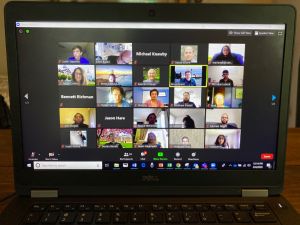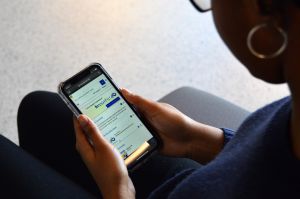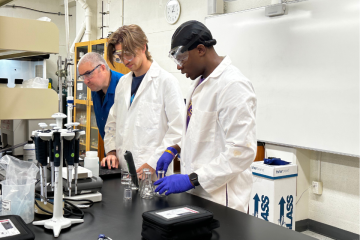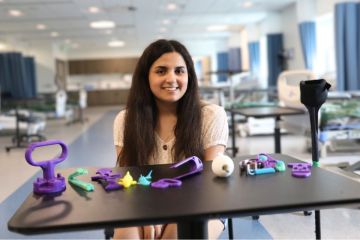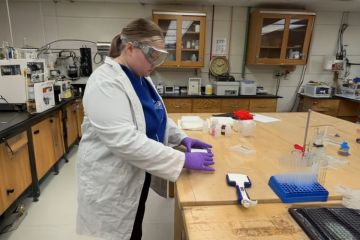Undergrad Summer Research Aims to Advance Our Knowledge of COVID-19 Pandemic

Donovan Stuard ‘21 hopes to never see another global health crisis like the COVID-19 pandemic in his lifetime, but if there is one, research he is conducting at Widener this summer could help predict how the financial markets will react.
As part of Widener’s Summer Undergraduate Research and Creative Activities (SURCA) program, Stuard and his classmate, Noel Franczyk, along with faculty advisor Assistant Professor YoungHa Ki, are analyzing how the S&P 500 and Russell 2000 responded during different stages of the coronavirus pandemic.
“Coronavirus is unprecedented – a once in a lifetime event – but understanding how markets react could give us a head start in helping clients make decisions about which sectors are less risky if a pandemic happens again,” said Stuard, a finance, economics, and accounting major.
Franczyk ‘21, a finance major and economics minor, said this research is both timely and reinforces what he learns as a member of Widener’s Money Club, which is responsible for running the student-managed investment fund, and in Widener’s Finance Lab, which features the same Bloomberg technology that professional asset managers and investors use to make real-time investment decisions.
Summer research is a good experience. It is important to be constantly analyzing the markets through hands-on repetition. The more you do it, the better you get at it. — Noel Franczyk
Their research is one of many projects at Widener this summer that have not only adjusted their format to a virtual setting, but have planned their research topics to focus on COVID-19.
For example, a psychology student is researching the effect of brands’ corporate social responsibility efforts on consumer attitudes and behaviors in the context of COVID, while political science students are analyzing governors’ social media accounts to determine how much of their communications focused on COVID-19.
Measuring Chronic Stress during COVID-19
Psychology major Victoria Mayer ’21 has long been interested in studying the effects of chronic stress on people. Just one problem: it’s difficult to ethically set up a study that subjects people to prolonged stress factors, let alone find a chronic stress factor that’s universal.
So instead, Mayer was planning to do her 2020 SURCA project on exercise and food perceptions. But in March, the perfect scenario for studying chronic stress fell into her lap – COVID-19.
The massively disruptive global pandemic packed a plethora of stressors, from health concerns, to the stay-at-home orders and social isolation, to job loss and economic collapse, to the lingering uncertainties about when normal life would return.
“This was a really clear, overall change in people’s lives,” said Mayer, an aspiring researcher.
Working with Associate Professor of Psychology Luke Ayers, Mayer’s SURCA project is trying to ascertain the impact of pandemic stress on our functionalities, looking at differences in stress levels based on everything from personality traits to socio-economic factors to job status.
To do this, Mayer and Ayers are developing a brief online survey that can be broadly distributed to people representing a cross-section of society. Through a combination of scale and free response questions, survey participants will be asked to rate how disruptive COVID has been on their lives and their physical and emotional symptoms of stress. This project will also examine factors that have helped people, such as social support and adaptive behaviors.
The researchers will then review the data to see which factors most impact individuals’ stress levels and behavioral responses. In this way, “we want to see what helped people thrive in this difficult situation, so that we can recommend best practices for the future,” said Ayers.
Analyzing Mental Health Services at Universities
As a field hockey player and communication studies major, Christiana Dunn ‘21, has focused her multiyear-long research at Widener on mental health services for college athletes.
Last summer, Dunn researched mental health services for athletes in Division I and II universities and presented her findings at the SURCA Symposium, held every September.
Then, Dunn, in collaboration with alumna Michaela Kolenkiewicz ‘20 and faculty advisor Dr. Angie Corbo, created the Breathe Campaign, a mental health resource tool on the university’s myWidener intranet portal, and raised awareness about it on campus and beyond.
Continuing with this award-winning research and campaign, Dunn is now analyzing how universities and their athletic departments promoted mental health services during the COVID-19 interruptions to the spring 2020 semester. Dunn is focusing on the coronavirus messaging of 10-12 universities in the same NCAA Division III athletic conference as Widener.
“I’m analyzing the different announcements from MAC Commonwealth (Middle Atlantic Conferences) to see how universities relayed the message and started to talk about COVID-19,” Dunn said. “Student athletes need to know there are mental health resources on campus and that it is ok to ask for help.”
Corbo, who co-leads SURCA and is chair of communication studies, said this research expands the Breathe Campaign and will help guide them as they determine how the campaign can meet students’ needs during a global pandemic.

